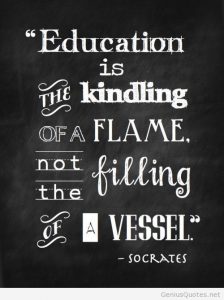
Although many of the courses I have taught have not been strictly composition courses, they have been related to learning the conventions of American English for Academic Purposes. There is a great deal of background knowledge needed, before words are ever put to paper. No matter the type of class, I situate it in co-construction of knowledge and critical thinking. I will always be a life-long learner and foster this in students. The ideas behind what they learn about writing should transcend individual assignments, to improve thinking before writing.
The ultimate goal should always be creating better writers not better individual pieces of writing.
Writing as a collaborative process
One of the first concepts I emphasize in my classroom is that writing is a process of brainstorming or pre-writing, actually getting ideas down on paper and the trickiest part, multiple stages of revision.  However, these activities are not a solitary act; writing is a collaborative process. By this I mean, first and foremost, that a writer is writing for a specific audience. They must always have in mind who the reader is going to be. This has a huge influence on how a piece is written. But writing as a collaborative process goes beyond this idea of writer and audience. A writer will often discuss their work with others and bounce ideas off them. This, too, is part of writing. They will be influenced, consciously or otherwise, by reading other writers’ pieces and might incorporate aspects of these writers’ ideas or styles. My classes form communities of practice, where students are on a shared journey to becoming more effective academic writers. Peers are themselves budding writers but also the readers and audience for each other’s papers. Critical evaluation of material is a crucial skill to develop as a college student of any academic course of study. In using peer review in my classroom, I help create an environment for discussion of ideas, but not without first giving students a foundation of how to review their classmates’ work productively by providing the same principles they will use to evaluate any writing they encounter.
However, these activities are not a solitary act; writing is a collaborative process. By this I mean, first and foremost, that a writer is writing for a specific audience. They must always have in mind who the reader is going to be. This has a huge influence on how a piece is written. But writing as a collaborative process goes beyond this idea of writer and audience. A writer will often discuss their work with others and bounce ideas off them. This, too, is part of writing. They will be influenced, consciously or otherwise, by reading other writers’ pieces and might incorporate aspects of these writers’ ideas or styles. My classes form communities of practice, where students are on a shared journey to becoming more effective academic writers. Peers are themselves budding writers but also the readers and audience for each other’s papers. Critical evaluation of material is a crucial skill to develop as a college student of any academic course of study. In using peer review in my classroom, I help create an environment for discussion of ideas, but not without first giving students a foundation of how to review their classmates’ work productively by providing the same principles they will use to evaluate any writing they encounter.
Student-focused and student-centered classroom

I have been able to develop my understanding of teaching through quite varied experiences. I have taught young learners as well as adults. While there are differences between them, there are certain aspects to teaching that go beyond age. Evaluations from my students consistently show they feel I genuinely care about their learning and well-being as a student and person. Since the students are my priority, I remain adaptable and flexible to their needs, which in turn has made me able to fit my teaching with any institution I become a part of. I have been able to hone these skills in classes of international students of varied backgrounds and my work with prisoners in the Norfolk City Jail with the non-profit group Humanities Behind Bars. My goal is always for them to learn to apply analytical skills from my class throughout their academic career and beyond. A student’s ability to recognize patterns of language and replicate them appropriately is crucial in any field.
Communicative Language Teaching
As someone who has extensively studied teaching English to non-native speakers, I follow many of the principles behind communicative language teaching and more specifically task-based language teaching. One of the crucial tenets being to always explain the purpose of any task. Over my many years as a writing tutor, I saw time and again students who did not understand the purpose of an assignment, or what they were supposed to be getting out of it, suddenly able to do it, without further help, after a basic explanation of the instructor’s intention. I ensure that my students are aware of the intention of any assignment or task, even if it is simply for a little extra practice. I have also found that applying assignments to a student’s actual situation gives them a personal connection. When I taught formal letter writing in a summer course for exchange students from the Mexican Military Program, the letter was addressed to the director of the English Language Center outlining improvement suggestions along with praise and gratitude.

While every assignment students receive will not be something meaningful to them, for the purpose of learning and practicing writing skills, a personal connection adds extra incentive to put forth more effort.

